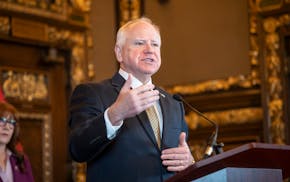When mortgage rates dipped to record lows a couple of years ago, Charles Eide quickly refinanced, scoring a once-in-a-lifetime rate of about 3%, slashing the payment on his split-level house in Maple Grove.
But while he and his wife, Jessica, loved the house — and the financial freedom that came with it — life on that idyllic cul-de-sac was missing something: goats and chickens and cows.
"For two years I've been telling myself I'm almost living for free," said Charles Eide. "But that rubbed up against the priorities that I had for my family."
This summer, the Eides upsized to a bucolic "ranch" in Greenfield, about 15 miles west of Maple Grove, where there's a barn and pastures and plenty of space for his family to live a little closer to nature.
The move meant Eide gets the lifestyle he's always coveted, but it also came with a mortgage rate double what he was paying.
The Eides are among a growing number of homeowners sacrificing their low rates for bigger and better houses that better suit their needs, fueling an increase in move-up home sales across the metro. It's a bright spot in a market that lost momentum this summer.
"More and more people are realizing that time is going to pass them by," said Kris Lindahl of Kris Lindahl Real Estate, who helped the Eides navigate the decision. "You're seeing more people say, 'The time element is becoming the priority.' They don't want to miss it all."
Nationwide, 6 out of 7 people with a mortgage have an interest rate below 6.46%, according to Redfin. This has created an unprecedented number of "rate-locked" homeowners who don't earn enough to comfortably afford a mortgage at a higher rate, making them feel trapped and obligated to keep their current home.
This massive pool of rate-locked homeowners has been blamed for stifling home sales by limiting the number of listings on the market, thereby boosting prices at a time of robust demand.
Still, the Redfin analysis of first-quarter data from the Federal Housing Finance Agency's National Mortgage Database showed the percentage was down from 90.6% at the start of last year and a record high of 92.8% in mid-2022.
Surveys shows that with mortgage rates slipping and family needs changing, a growing number of homeowners have decided to bite the bullet and swap the savings that come with their record-low rate for a house that better fits their needs.
"At the end of the day owning a home is all about emotions," Lindahl said. "If you stick with logic and remove the potential memories, you're going to have that regret later."
That trend is expected to accelerate in the coming months in the wake of the Federal Reserve's decision Wednesday to cut its benchmark lending rate by a half-point. While mortgage rates aren't directly tied to the Fed action, they were down by Thursday.
Already more than a full percentage point lower than a year ago, Freddie Mac reported 30-year average mortgage rate of 6.09%, down 0.11 points from last week, and a 15-year rate of 5.15%, down 0.12 points from last week.
The rates — which Freddie Mac predicts will dip more — could change the equation for buyers who have struggled to make a move.
Only about 11% of all homeowners with a mortgage in the Twin Cities are not beholden to a low rate, meaning they could easily move onto another home because they can afford to pay cash or they have enough income to afford a higher monthly payment or a bigger down payment, according to Zillow.
Baby boomers are much more likely to be in that category.
"The so-called mortgage rate lock-in effect has seriously curtailed both home sales and inventory over the past two years," Orphe Divounguy, Zillow senior economist, said in a statement. However, "massive appreciation has left homeowners with record levels of equity, and many are financially able to move on, even given today's higher rates."
In the Twin Cities metro, those baby boomers are helping fuel a steep increase in sales of houses priced at more than $350,000 at a time when starter home sales are sagging. Last month, pending sales of houses priced at more than $1 million increased 14%, while those priced at $150,000 to $250,000 fell more than 15%.
Eide, founder and CEO of an event production company, said days after Lindahl listed the $650,000 Maple Grove house, he got nearly a half-dozen offers and sold it for $25,000 more than the asking price. He parlayed that gain and more equity than he expected into the house in Greenfield, helping ease the pain of giving up his low rate.
Still, it's a move that has added thousands to his monthly housing expenses, he said.
Eide has no regrets. Though he didn't grow up on a farm, he'll never forget visiting his grandfather in rural central Illinois where he rode ponies and horses and learned to appreciate a more rural lifestyle than the one he had.
"He really instilled in me an appreciation for animals and nature," Eide said. "I'd always thought, 'That's pie in the sky, that's expensive and I can't afford that.'"
Even before the closing this summer, Eide ordered 15 chicks and a trio of goats. While he loved his Maple Grove home, he said suburban life is defined by electronic devices and trips to the mall.
"Kids today have become so weak, especially with tech and iPads and phones, and they don't go outside or do anything," he said. "I felt this inner responsibility to contribute to our world by making capable people, so I thought that instead of this cushy cul-de-sac living, we'll move to a place where the kids will have chores at 5 a.m. whether it's snowing or sunny, and I'll teach them a work ethic and teach them what it is to have responsibility."
Eide said he realized if he ever was going to give his kids the lifestyle he dreamed of, it had to happen quickly. His oldest daughter was about to turn 14, and the other kids weren't far behind.
"I realized that all this stuff I wanted to do [with the kids] is slipping away," he said
The Eides' new house doesn't have significantly more living space than the one in Maple Grove, but it has plenty of acreage, a horse barn and fenced pastures for animals, giving it a "Yellowstone" vibe, he said.
The sellers, an older couple who raise horses, were eager to have animals and kids on the land.
"Our goal is to really bring it back to life," Eide said.
But to make the higher mortgage payment and feed the animals — cattle are also on the way — he'll have to watch his spending and cut back on his travel budget.
"It's like a balancing act," he said. "The money is less important than the time I'm losing. Financially, it is a sacrifice and it is going to be a challenge, but [while] the return on that investment might not be financial, it'll show up in the lives of my children."

Delta hiked fares for solo travelers, until Twin Cities travel experts caught the change

In first speech back, UnitedHealth's new CEO pledges to review hot-button issues

A child had measles at Mall of America, concerning state health officials who don't know source

Ramstad: Gov. Walz, things are not getting done in Minnesota

